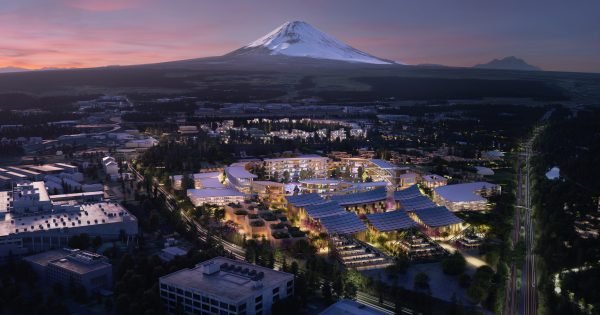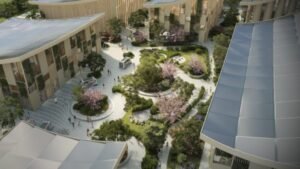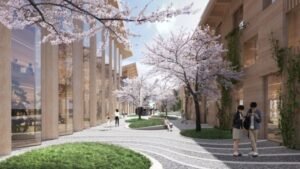CAR INDUSTRY LOOKING THE FUTURE WITH A LABORATORY CITY: WOVEN

Mobility is a magic word. Mobility give the sense of freedom, services with the public transportation, and today this is blend with the concept of transportation.
“Transportation is the act of moving goods or people. Mobility is the ability to freely move or be moved. The important difference here is the word ability. … In other words: transportation is something you do and mobility is something you have.”
Car industry
Is try to boost all the activities and project that have like a commons goals the sustainability.
A Brand like Bentley, has invested in eco transportation in their plants, invested in solar panel and waste and water management to reduce the eco impact, and his project Beyond 100 aims to have a fully plug-in hybrid range in the next five six years and a full electric range from 2030, more or less the same strategies for the cars portfolio has been announced from Ford Motor Company for the European market.
But Toyota, the “mother” of the Hybridization in the car industry, what they do, and what they plan for the future?
A city, at the bottom of the Fuji mountain and his name is Woven. Woven City, it will be a fully connected ecosystem powered by hydrogen fuel cells.
Envisioned as a “living laboratory,” the Woven City will serve as a home to full- time residents and researchers who will be able to test and develop technologies such as autonomy, robotics, personal mobility, smart homes and artificial intelligence in a real-world environment.
“Building a complete city from the ground up, even on a small scale like this, is a unique opportunity to develop future technologies, including a digital operating system for the city’s infrastructure. With people, buildings and vehicles all connected and communicating with each other through data and sensors, we will be able to test connected AI technology… in both the virtual and the physical realms … maximizing its potential,” said Akio Toyoda, president, Toyota Motor Corporation.
Toyota will extend an open invitation to collaborate with other commercial and academic partners and invite interested scientists and researchers from around the world to come work on their own projects in this one-of-a-kind, real-world incubator.
“We welcome all those inspired to improve the way we live in the future, to take advantage of this unique research ecosystem and join us in our quest to create an ever-better way of life and mobility for all,” said Akio Toyoda, president, Toyota Motor Corporation.
For the design of Woven City, Toyota has commissioned Danish architect, Bjarke Ingels, founder and creative director, Bjarke Ingels Group (BIG). His team at BIG have designed many high-profile projects: from 2 World Trade Center in New York and Lego House in Denmark, to Google’s Mountain View and London headquarters.
The masterplan of the city includes the designations for street usage into three types: for faster vehicles only, for a mix of lower speed, personal mobility and pedestrians, and for a park-like promenade for pedestrians only. These three street types weave together to form an organic grid pattern to help accelerate the testing of autonomy.
The city is planned to be fully sustainable, with buildings made mostly of wood to minimize the carbon footprint, using traditional Japanese wood joinery, combined with robotic production methods. The rooftops will be covered in photo-voltaic panels to generate solar power in addition to power generated by hydrogen fuel cells. Toyota plans to weave in the outdoors throughout the city, with native vegetation and hydroponics.
Residences will be equipped with the latest in human support technologies, such as in-home robotics to assist with daily living. The homes will use sensor-based AI to check occupants’ health, take care of basic needs and enhance daily life, creating an opportunity to deploy connected technology with integrity and trust, securely and positively.
To move residents through the city, only fully-autonomous, zero-emission vehicles will be allowed on the main thoroughfares. In and throughout Woven City, autonomous Toyota e-Palettes will be used for transportation and deliveries, as well as for changeable mobile retail.
Both neighborhood parks and a large central park for recreation, as well as a central plaza for social gatherings, are designed to bring the community together. Toyota believes that encouraging human connection will be an equally important aspect of this experience.
Toyota plans to populate Woven City with Toyota Motor Corporation employees and their families, retired couples, retailers, visiting scientists, and industry partners. The plan is for 2000 people to start, adding more as the project evolves.
Comments are closed.





